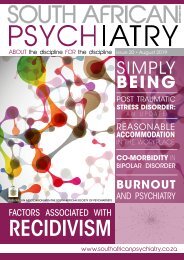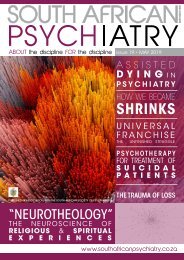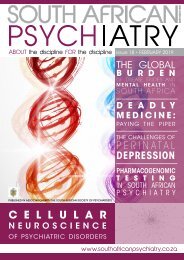South African Psychiatry - November 2018
South African Psychiatry - November 2018
South African Psychiatry - November 2018
Create successful ePaper yourself
Turn your PDF publications into a flip-book with our unique Google optimized e-Paper software.
POLICY GUIDELINE<br />
THE SOUTH AFRICAN NATIONAL MENTAL HEALTH ALLIANCE PARTNERS’ RESPONSE TO THE:<br />
POLICY GUIDELINES FOR THE<br />
LICENSING OF RESIDENTIAL AND/<br />
OR DAY CARE FACILITIES FOR<br />
PERSONS WITH MENTAL<br />
ILLNESS AND/OR SEVERE OR<br />
PROFOUND INTELLECTUAL<br />
DISABILITY<br />
Submitted for publication by Dr Lesley Robertson, drafted on behalf of SASOP and the<br />
Mental Health Alliance<br />
As <strong>South</strong> <strong>African</strong> citizens and organisations<br />
who are concerned that people living with<br />
mental illness (PLWMI) and/or intellectual<br />
disability (ID) are treated with dignity and<br />
respect in our society, we welcome the initiative<br />
by the National Department of Health (NDOH) to<br />
establish a regulatory process of non-governmental<br />
residential and/or day care facilities (NGOs) for this<br />
vulnerable and marginalised population group.<br />
WE ARE CONCERNED, HOWEVER, THAT<br />
THE GUIDELINES, BEING PUBLISHED IN THE<br />
WAKE OF THE LIFE ESIDIMENI DISASTER,<br />
INAPPROPRIATELY CONFLATE DIFFERENT<br />
TYPES OF SERVICES AND FACILITIES AND<br />
SEEK TO ENSURE THAT NGOS ARE ABLE<br />
TO PROVIDE THE SAME LEVEL OF CARE<br />
AS A CHRONIC CARE FACILITY LIKE LIFE<br />
ESIDIMENI.<br />
This can never be the case and we maintain that a<br />
facility like Life Esidimeni will always be required for<br />
some mental health care users. Some users, however,<br />
can appropriately use community based services<br />
and it is the licensing of these services and this level<br />
of care that the Guidelines should seek to regulate.<br />
In conflating the levels of care, we find the guidelines<br />
to be self-contradictory, not completely relevant to<br />
the role of NGOs, and not implementable. Thus, we<br />
support the press statement made by the <strong>South</strong><br />
<strong>African</strong> Federation of Mental Health on 29 March<br />
and believe that stakeholder consultation was<br />
inadequate.<br />
APPLICATION OF THE GUIDELINES<br />
The Policy Guidelines specify their application is to<br />
facilities which are “not a designated psychiatric<br />
hospital or care and rehabilitation centre” (4.1).<br />
The “group homes, half-way houses, supported<br />
independent living facilities” … and “day care<br />
facilities, include home-based care, protected<br />
workshops and support groups” to which they refer<br />
(4.2) are defined by the guidelines in the context of<br />
a social role in the societal inclusion of PLWMI and/<br />
or ID. Thus, they do not appear to offer a ‘health’,<br />
‘medical’ or ‘psychiatric’ role. In addition, the IUSS<br />
norms and standards for mental health (2.4) states<br />
that these facilities should be ‘homely’ and make no<br />
infrastructure requirements for hospital type care.<br />
Nevertheless, the guidelines seem to subsume all<br />
support services for PLWMI under a healthcare<br />
framework, reflecting an inappropriately medicalised<br />
understanding of mental health and disability and<br />
ignoring the intersectoral nature of communitybased<br />
support. This is at odds with the recovery<br />
model and principles of inclusion which underpin the<br />
Mental Health Strategic Framework, the Framework<br />
and Strategy on Disability and Rehabilitation, and<br />
not least, the United Nations Convention on the<br />
Rights of Persons with Disabilities, which <strong>South</strong> Africa<br />
has ratified.<br />
86 * SOUTH AFRICAN PSYCHIATRY ISSUE 17 <strong>2018</strong>

















